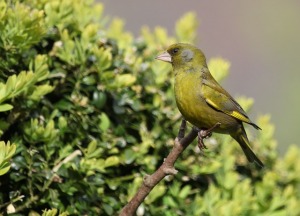Recently a surprising thing happened as my analysand was talking about whether he could trust his assessments of new emotional experiences. He wondered, did I know what he was  talking about? Had I had similar experiences? How do we really know that the way we are interpreting an event- a motive of our friend or boss, an insight, even a perception – is true? We could just be complimenting or castigating ourselves, after all, with our own made-up view. Surely the other person would see it differently, with themselves as the protagonist or the villain. Suddenly he saw a bright green bird high in the magnolia tree that nearly fills the area outside my large picture window. It appeared at a perfect time in the session to highlight the questions he had just been asking. These questions quickly attached themselves to the sighting: Was it real? Imagined? Hallucinated?
talking about? Had I had similar experiences? How do we really know that the way we are interpreting an event- a motive of our friend or boss, an insight, even a perception – is true? We could just be complimenting or castigating ourselves, after all, with our own made-up view. Surely the other person would see it differently, with themselves as the protagonist or the villain. Suddenly he saw a bright green bird high in the magnolia tree that nearly fills the area outside my large picture window. It appeared at a perfect time in the session to highlight the questions he had just been asking. These questions quickly attached themselves to the sighting: Was it real? Imagined? Hallucinated?
Google suggested that the tiny green bird might be a rare sighting of a migrating orange-crested warbler, touching down briefly on its journey. Or was it just a trick of light, the lush dark green of the leaves casting a green glow on another little bird? In a session with another analysand, the hour before this patient was due to arrive for his next session, I saw the brightest cardinal I thought I had ever seen. It stood on a twig for what seemed like a long time, cocking its uncannily bright head and seeming intent on studying us indoors in our glassed-in world. What was going on in my tree? Something about the light? Or do we attend to things selectively for purposes we only discover later (if at all) or because they seem to fit in a stream of associations simply because we, ourselves, have gathered them into it in ways that help us understand and communicate with each other?
Luckily, it is such questions themselves, rather than their answers, that propel an analysis, or indeed any other form of the examined life. Luckily, many questions do not have totally satisfying answers, since if they did, that would be the end of the exploration.
Mara Wagner, Psya.D., Cert.Psya.